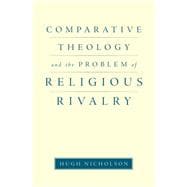
Note: Supplemental materials are not guaranteed with Rental or Used book purchases.
Purchase Benefits
What is included with this book?
| Abbreviations | p. xxiii |
| Introduction | p. 1 |
| A Utopian Quest for Unmarked Faith | p. 1 |
| The Inescapability of the Political | p. 6 |
| The Political Goes ôAll the Way Down,ö | p. 10 |
| A Shift in Strategy | p. 11 |
| Demarginalizing Comparative Theology | p. 12 |
| The Argument of This Book | p. 13 |
| Theology and the Political | |
| The Reunification of Theology and Comparison in the New Comparative Theology | p. 21 |
| The Comparative Theology of the Nineteenth-Century | p. 22 |
| The New Comparative Theology as a Fresh Alternative to the Theology of Religions | p. 26 |
| A Comparison of Comparative Theologies | p. 30 |
| Comparative Theology as an Expression of Global Hegemonism? | p. 34 |
| Comparative Theology as the Paradigm for the New Comparativism | p. 38 |
| Two Kinds of Acknowledgment | p. 43 |
| The Modern Quest to Depoliticize Theology | p. 49 |
| Enlightenment Natural Religion | p. 52 |
| Schleiermacher's True Church | p. 55 |
| Drey's Concept of World Religion | p. 59 |
| Clarke's Comparative Theology | p. 62 |
| The Transition from Christian Universalism to Religious Pluralism | p. 66 |
| George Lindbeck and the Postliberal Turn | p. 70 |
| Kathryn Tanner's Relational Theory of Christian Identity | p. 75 |
| Concluding Remarks | p. 78 |
| From Apologetics to Comparison: Toward a Dialectical Model of Comparative Theology | p. 79 |
| The Political Moment in Tanner's Relational Theory of Christian Identity | p. 84 |
| The Political Moment of Christian Identity: Two Christian Apologetic Constructions of Self and Other | p. 88 |
| Comparison as a Technique for Deconstructing Dichotomous Typifications | p. 94 |
| Metonymical Comparison in Traditional Apologetics | p. 99 |
| Metaphorical Comparison | p. 101 |
| The Inscription of Comparative Theology in an Apologetic Tradition | p. 103 |
| Mysticism East and West Revisited | |
| Mysticism East and West as Christian Apologetic | p. 109 |
| Otto's Apologetic in Mysticism East and West | p. 110 |
| The Retrieval of Meister Eckhart and the Question of Pantheism | p. 111 |
| The Emergence of Sankara's Vedanta as the Epitome of Hinduism | p. 114 |
| Otto's Use of Both the Perennialist and Apologetic Traditions | p. 119 |
| The Parallels between the Two Masters | p. 121 |
| The Essential Difference between Sankara and Eckhart | p. 122 |
| God and the God beyond God in Eckhart and Sankara | p. 129 |
| Two Theological Paradigms in Eckhart's Mystical Theology | p. 131 |
| Sankara's Concept of Brahman as a Double Paradigm | p. 140 |
| The Proto-Commentator and the Isvara Paradigm | p. 145 |
| Sankara and the Apophatic Paradigm | p. 147 |
| From Acosmism to Dialectic: Sankara and Eckhart on the Ontological Status of the Phenomenal World | p. 153 |
| The Problem of Acosmism in Sankara and Eckhart | p. 153 |
| A Transformative Commentary on Realist Vedanta: Sankara's Reinterpretation of BS 2.1.14 | p. 155 |
| From Analogy to Dialectic: Eckhart's Reinterpretation of the Analogia Entis | p. 161 |
| Dialectic in the BSBh: The ôDouble Beingö of Sankara's ôName and Form,ö | p. 167 |
| Liberative Knowledge as ôLiving without a Why,ö | p. 175 |
| Eckhart's ôLiving without a Whyö: Spontaneous Activity from Detachment | p. 177 |
| Sankara's Antithesis of Action and Knowledge | p. 181 |
| Enlightened Action in Sankara? | p. 188 |
| The Polemical Dimension of ôLiving without a Why,ö | p. 193 |
| Conclusion | p. 197 |
| Two Purposes, Two Comparisons | p. 197 |
| Two Paradigms of Critical Thought and the Question of the Comparative Method | p. 199 |
| Notes | p. 205 |
| Bibliography | p. 287 |
| Index | p. 305 |
| Table of Contents provided by Ingram. All Rights Reserved. |
The New copy of this book will include any supplemental materials advertised. Please check the title of the book to determine if it should include any access cards, study guides, lab manuals, CDs, etc.
The Used, Rental and eBook copies of this book are not guaranteed to include any supplemental materials. Typically, only the book itself is included. This is true even if the title states it includes any access cards, study guides, lab manuals, CDs, etc.